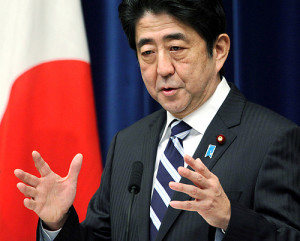
Japanese and American trade negotiators reported making “progress” but reaching no final agreement on establishing the Trans Pacific-Partnership (TPP) after intensive two-day negotiations in Tokyo ended late Tuesday.
Japanese Prime Minister Shinzo Abe would like to have something positive to report when he meets next week with President Barack Obama and when he is scheduled to address a joint session of Congress, becoming the first Japanese premier to do so.
But Abe was philosophical about not reaching a deal, telling the Wall Street Journal that “when you climb a mountain the last step is always the hardest.”
The main stumbling blocks are rice and automobile parts. Washington wants Japan to establish an import quota for rice. U.S. negotiators have lowered their demand from 215,000 tons annually to 175,000, but Tokyo’s negotiators are still holding out for a maximum of 50,000.
For its part, Tokyo wants the U.S. to immediately eliminate the tariffs on automobile parts, something that, so far, Washington has flatly refused to do.
These two trade issues are tough to resolve since they involve key interests groups in both countries.
Farmers in Japan have an outsized influence on Abe’s Liberal Democratic Party, while automobile workers are a critical constituency for Democrats in America’s Middle West.
Obama is feeling the pressure to resolve the issue before the 2016 presidential contest drowns everything out. Four politicians in both the Republican and Democratic Parties, including former First Lady Hillary Clinton, have already announced their candidacies.
The issue is unusual in that almost all Congressional Republicans favor the TPP, while many members of Obama’s own Democrats are uneasy about it due to worries it would cost jobs.
The trade pact, however, cleared an important hurdle when a bi-partisan majority of senators said they would support giving Obama “fast track” authority to negotiate the deal while assuring that final Congressional approval will not be bogged down by extraneous amendments or other parliamentary maneuvers.
The other 10 countries involved have been watching both what will transpire from U.S.-Japan bilateral talks, as well as the situation in Congress.
More talks with the wider group – which includes Australia, Brunei, Canada, Chile, Malaysia, Mexico, New Zealand, Peru, Singapore and Vietnam — will take place later this week.
The issue has taken on geopolitical importance beyond free trade, as Washington is anxious to counter China by passing what it considers an important element in its “rebalancing” strategy aimed at paying more attention to Asia and less to the Middle East. China is not among the 12 partners.
Washington’s growing anxieties about China were heightened in recent weeks by Beijing’s success in recruiting members to its new Asian Infrastructure Investment Bank. Americans were shocked at how many of its friends and allies — countries like Australia, but not Japan — have eagerly joined this new venture.